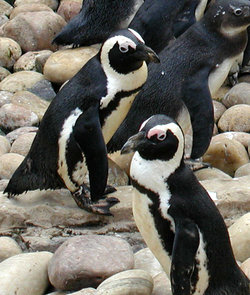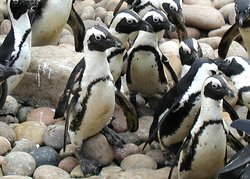African Penguin
|
|
| African Penguin | ||||||||||||||||
|---|---|---|---|---|---|---|---|---|---|---|---|---|---|---|---|---|
 Spheniscus demersus, the African penguin | ||||||||||||||||
| Scientific classification | ||||||||||||||||
| ||||||||||||||||
| Binomial name | ||||||||||||||||
The African Penguin (Spheniscus demersus), also known as the Jackass Penguin (after its donkey-like braying call), is found on the south-western coast of Africa, living in colonies on 24 islands between Namibia and Algoa Bay, near Port Elizabeth, South Africa. The largest colony is on Dyer Island, near Kleinbaai. The only penguin colonies still in existence on the African mainland are near Cape Town at Boulders Beach in Simonstown and Stony Point in Betty's Bay.
Boulders Beach is a popular tourist attraction, for the beach, swimming and the penguins. The penguins will allow people to approach them as close as a meter (three foot), and so are much photographed.
The closest relatives of the African Penguins are the Humboldt and Magellanic penguins found in southern South America and the Galapagos Penguin found in the Pacific Ocean near the equator. African Penguins like warm weather.
African Penguins grow to 50 cm tall and weigh between 2 and 4 kilograms. They have a black stripe and black spots on the chest, the spots being unique for every penguin, like human fingerprints. They have pink sweat glands above their eyes. The hotter the penguin gets, the pinker the sweat glands become. The males are larger than the females and have larger beaks.
They breed throughout the year, the main breeding season starting in February. Females lay two eggs, with an incubation period of 38-42 days. They are a monogamous species and the lifelong partners take turns to incubate their eggs and feed their young. The moulting season is between October and February, with the majority of the birds moulting in November and December, after which they head out to sea to feed (since they do not feed during moulting season and remain on land). Their diet includes small fish such as sardines and anchovies. The penguins obtain water from the fish they eat.
African Penguins have an average lifespan of 10-11 years, the females reaching sexual maturity at the age of 4 years, and males at the age of 5 years. The highest recorded age for a bird of this species has been 24. The overall population of the species has fallen by some 90% during the last 10 years, the current population (as of 2003) estimated at 179 000 adults, with 56 000 breeding pairs.
As recently as the mid-twentieth century, penguin eggs were considered a delicacy and were still being collected for sale. Unfortunately, the practice was to smash any eggs found a few days prior to gathering, in order to ensure that only fresh ones were sold. This added to the drastic decline of the penguin population around the Cape coast, a decline which was hastened by pollution of the penguins' natural habitat by petrochemicals from spills, shipwrecks and cleaning of tankers while at sea.
Missing image African_penguins.jpg African Penguins on Boulder Beach near Cape Town. | Missing image Jackass-Penguin.jpg |
fr:Manchot du Cap it:Spheniscus demersus nl:Afrikaanse pinguïn ja:ケープペンギン

